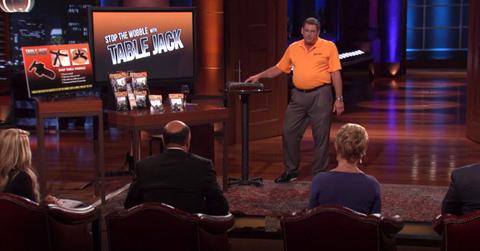‘Shark Tank’ Sharks Thought Table Jack Was a Wobbly Business Prospect
Inventor Steve Christian apparently thought Table Jack had a net worth of $400,000, but the "Shark Tank" sharks didn’t see the same value.
May 7 2021, Published 3:59 p.m. ET

Steve Christian apparently thought his Table Jack innovation had a net worth of $400,000 when he pitched the product in Season 6 of ABC’s Shark Tank. As viewers saw in that 2014 installment, the inventor wanted $100,000 in exchange for a 25-percent stake in his business.
Unfortunately for Christian, the sharks in that episode—Barbara Corcoran, Mark Cuban, Lori Greiner, Kevin O’Leary, and Robert Herjavec—didn’t see the same value and sent the inventor away without a deal.
However, that setback wasn’t the end of the Table Jack story.
Table Jack was the answer to the “number-one complaint” in the restaurant biz.
“I’ve been in the restaurant industry for 18 years, and I hate the same things that customers do: wobbly tables. [It’s] the number-one complaint in the restaurants,” Christian said during his Shark Tank pitch. “Normally, we would get down and put products underneath the table so that we could stable them out. What I’ve invented is the longest-lasting, most cost-efficient, durable stabilizer ever made: the Table Jack.”

Steve Christian on 'Shark Tank'
As Christian explained it, a restaurant employee could stabilize a table with the press of a foot on the Table Jack and then get back to serving the customers, instead of wasting time looking for sugar packets or something else to “fix the furniture.”
A few of the sharks could relate to Christian. Cuban was once a door-to-door salesman, just like the Texas-based inventor was at the time. Herjavec used to work in a restaurant. Corcoran was once a waitress—although she contended that she earned most of her tips bending down to fix wobbly tables.
Eventually, everyone but Cuban opted out of the deal, and Christian pleaded his case. He said, “I’m so close to getting over the hill on this,” he said. “I need to get past that gatekeeper and where they could see them. Them people sitting up there in that office, they don’t know that they have wobbly tables in the restaurants.”
Ultimately, Cuban declined to invest. “If you’re willing to go door-to-door, you can sell anything. But the problem is, I’m not really to invest $100,000 to be a partner,” he said. “I’m not ready to make the commitment or the investments, and for that reason, I’m out.”
Table Jacks was “impossible” to scale.
In a Chicago Inno recap of the episode, Chicago Ventures senior associate Ezra Galston presented “the math in Table Jack’s case.”
Galston computed that if the profit of each Table Jack is $11.25 and if a salesperson could sell four units each to six restaurants per day for six days a week, that salesperson could make $87,000 in Table Jack profit per year.
“That would be good if salespeople and travel were free—they’re not,” Galston added. “At best, you’d see $15-25k net profit per salesperson; that’s an impossible business to scale.”
Table Jack is still in business.
Try a sample for ONLY $12.99 at www.tablejacks.com
Posted by Tablejacks LLC on Monday, September 26, 2016
Christian is still selling the Table Jack—billed as “the most advanced table stabilizer system on the market”—on the product’s official website. The site claims that the list of Table Jack customers include locations of Rainforest Café, Hooters, Hilton Hotels & Resorts, Olive Garden, Pizza Hut, TGI Fridays, and Corner Bakery Café, in addition to dozens more chains.
“Already installed in some of the most demanding restaurant locations, the Table Jack stands up to the most harsh environments while providing its customers a truly wobble free experience,” the site touts.
